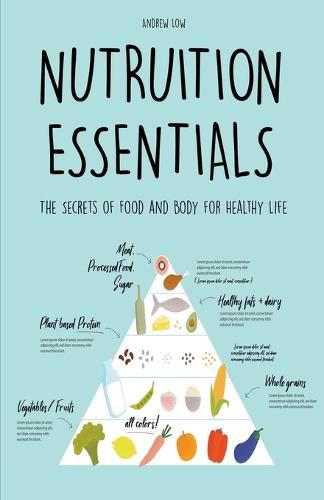Readings Newsletter
Become a Readings Member to make your shopping experience even easier.
Sign in or sign up for free!
You’re not far away from qualifying for FREE standard shipping within Australia
You’ve qualified for FREE standard shipping within Australia
The cart is loading…






This title is printed to order. This book may have been self-published. If so, we cannot guarantee the quality of the content. In the main most books will have gone through the editing process however some may not. We therefore suggest that you be aware of this before ordering this book. If in doubt check either the author or publisher’s details as we are unable to accept any returns unless they are faulty. Please contact us if you have any questions.
The foods you eat have significant effects on your health and quality of life. Although eating healthy can be pretty straightforward, the rise in popular "diets" and dieting trends has caused confusion. In fact, these trends often distract from the most critical basic nutrition principles. This is a detailed beginner's guide to healthy eating, based on the latest in nutrition science. Research continues to link serious diseases to a poor diet. For example, eating healthy can drastically reduce your chances of developing heart disease and cancer, the world's leading killers. A good diet can improve all aspects of life, from brain function to physical performance. In fact, food affects all your cells and organs.
In recent years, the importance of calories has been pushed aside. While calorie counting isn't always necessary, total calorie intake still plays a crucial role in weight control and health. If you put in more calories than you burn, you will store them as new muscle or body fat. If you consume fewer calories than you burn every day, you will lose weight. If you want to lose weight, you must create some form of calorie deficit. In contrast, if you are trying to gain weight and increase muscle mass, you need to eat more than your body burns. If you participate in exercise or sports, there is no doubt that a healthy diet will help you perform better.
You should aim to consume whole foods at least 80-90% of the time. The term "whole foods" generally describes natural, unprocessed foods containing only one ingredient. If the product looks like it was made in a factory, it's probably not whole food. Whole foods tend to be nutrient-dense and have a lower energy density. This means that they have fewer calories and more nutrients per serving than processed foods. In contrast, many processed foods have little nutritional value and are often "empty" calories. Eating them in large amounts is linked to obesity and other diseases.
$9.00 standard shipping within Australia
FREE standard shipping within Australia for orders over $100.00
Express & International shipping calculated at checkout
This title is printed to order. This book may have been self-published. If so, we cannot guarantee the quality of the content. In the main most books will have gone through the editing process however some may not. We therefore suggest that you be aware of this before ordering this book. If in doubt check either the author or publisher’s details as we are unable to accept any returns unless they are faulty. Please contact us if you have any questions.
The foods you eat have significant effects on your health and quality of life. Although eating healthy can be pretty straightforward, the rise in popular "diets" and dieting trends has caused confusion. In fact, these trends often distract from the most critical basic nutrition principles. This is a detailed beginner's guide to healthy eating, based on the latest in nutrition science. Research continues to link serious diseases to a poor diet. For example, eating healthy can drastically reduce your chances of developing heart disease and cancer, the world's leading killers. A good diet can improve all aspects of life, from brain function to physical performance. In fact, food affects all your cells and organs.
In recent years, the importance of calories has been pushed aside. While calorie counting isn't always necessary, total calorie intake still plays a crucial role in weight control and health. If you put in more calories than you burn, you will store them as new muscle or body fat. If you consume fewer calories than you burn every day, you will lose weight. If you want to lose weight, you must create some form of calorie deficit. In contrast, if you are trying to gain weight and increase muscle mass, you need to eat more than your body burns. If you participate in exercise or sports, there is no doubt that a healthy diet will help you perform better.
You should aim to consume whole foods at least 80-90% of the time. The term "whole foods" generally describes natural, unprocessed foods containing only one ingredient. If the product looks like it was made in a factory, it's probably not whole food. Whole foods tend to be nutrient-dense and have a lower energy density. This means that they have fewer calories and more nutrients per serving than processed foods. In contrast, many processed foods have little nutritional value and are often "empty" calories. Eating them in large amounts is linked to obesity and other diseases.